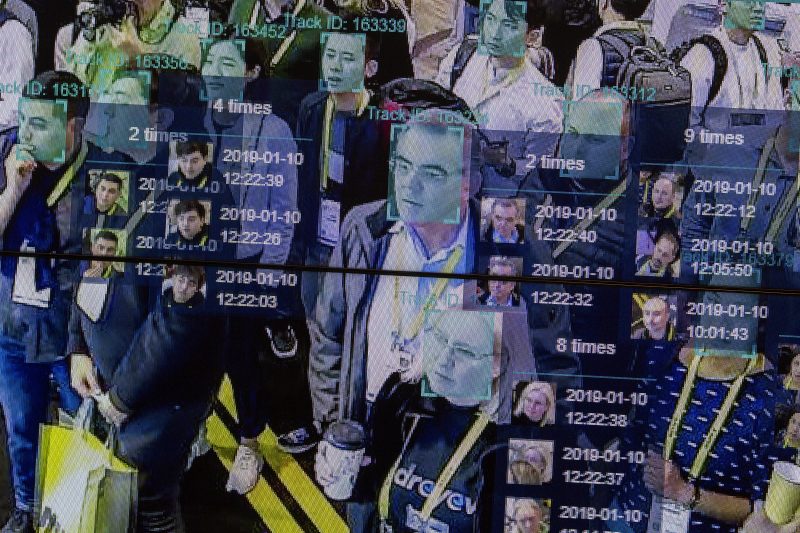San Francisco ban highlights facial recognition fears
Facial recognition for law enforcement is being banned in San Francisco, igniting fresh debate on the privacy and civil liberties concerns about the technology (DAVID MCNEW)
Washington (AFP) – A ban on facial recognition for law enforcement in San Francisco highlights growing public concerns about technology which is seeing stunning growth for an array of applications while provoking worries over privacy.
All but one of the nine members of San Francisco’s board of supervisors endorsed the legislation Tuesday, which will be voted on again next week in a procedural step.
Facial recognition technology uses a scan of a person’s face to create an algorithm that is compared against a database. It can be used to unlock a smartphone or vehicle, pay in retail stores, verify identities at bank machines or develop customized fashion or beauty recommendations.
But its use in law enforcement has created the greatest outcry among rights activists because of the potential for errors and mismatches, and because the technology relies on vast databases that may have little or no oversight.
– ‘We’re not helpless’ –
Adding to those concerns has been the deployment in China of a vast surveillance system that can track criminals but also dissidents, and which has been used to track the movements of the Uighur Muslim minority, according to some reports.
The move in San Francisco “is a reminder we’re not helpless in the face of technology,” said Jay Stanley, a policy analyst with the American Civil Liberties Union.
“Certainly you can’t stop technology development and research but that doesn’t mean we can’t stop the deployment of technology to protect our values.”
While facial recognition may help catch criminals faster than traditional methods, civil liberties activists say the technology is not perfect, with high error rates for minorities found in some studies.
“As things stand, it is inappropriate for government agencies to use face recognition technology because the dangers substantially outweigh the benefits,” said Evan Selinger, a professor at the Rochester Institute of Technology and fellow at the Future of Privacy Forum.
Tiffany Li, a researcher at the Yale Law School’s Information Society Project, echoed those sentiments, arguing that more needs to be done to study the impact of facial recognition on civil liberties.
“The tech is not accurate, fair, or safe enough yet. And our laws and policies don’t know how to safeguard us from the many abuses that can occur,” Li tweeted.
– Wide deployment –
Despite the ban in San Francisco — and legislation being considered in other municipalities — use of facial recognition is growing in cities in the US and elsewhere.
A 2016 study by Georgetown University researchers found about 64 million Americans were in at least one database in “a virtual line-up” even if most had no criminal record, and that there was little knowledge of whether these systems were accurate or unfairly impacted minorities.
The researchers found nearly 4,000 state and local law enforcement agencies, or 25 percent of the total, have the ability to run face recognition searches of their own system or that of another agency such as the FBI.
Facial recognition is being deployed in airports around the United States, aiming to help speed boarding and arrivals and also monitoring for suspects and people who may have overstayed their visas.
US customs authorities are also reported to be studying the technology to help identify illegal immigrants.
Microsoft has joined critics of facial recognition deployment by government agencies. Its president Brad Smith said last year it was urgent to begin placing limits on facial recognition to avoid the surveillance state described in George Orwell’s “1984.”
– Safer and faster –
Supporters of the technology argue that facial recognition systems can help police fight crime and keep streets safer.
Daniel Castro of the Information Technology and Innovation Foundation, a think tank following technology issues, noted that authorities “can use facial recognition to efficiently and effectively identify suspects, find missing children or lost seniors, and secure access to government buildings” and save considerable expense compared with doing these tasks manually.
Concerns about moving toward Chinese-style surveillance systems are unwarranted because the United States has strong constitutional protections, Castro said.
“Ironically, a ban on facial recognition is a step backwards for privacy,” Castro said in a statement.
“Rather than having individuals monitor surveillance cameras, facial recognition technology would use unmanned cameras… Focusing on technology bans misses opportunities to make communities safer and increase privacy.”
Disclaimer: Validity of the above story is for 7 Days from original date of publishing. Source: AFP.


